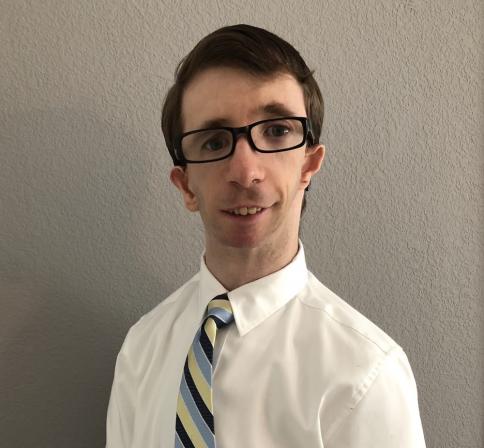
Nathaniel Myall, MD, is a clinical assistant professor at the Stanford Cancer Center in Stanford, California. He completed his residency and fellowship training at Stanford before joining the faculty in 2020. He specializes in the treatment of lung, thymic, and neuroendocrine cancers and is active on the inpatient oncology service at Stanford Hospital. Outside of work, he enjoys spending time with family, running, and rooting for Bay Area sports teams.
I remember wondering, sometime during the COVID-19 pandemic, if the switch to telehealth video visits limited my assessment of my patients’ disabilities. Wheelchairs now sat below the camera’s view. Hearing impairments could be mistaken for technical difficulties. Even visual impairments appeared easier to navigate from the comfort of one’s living room compared to the unfamiliar clinic space.
For many of my patients with cancer and disabilities, video visits represented a welcome accommodation. From their perspective, the frequent visits and intensive treatments required in cancer care could add to the burdens they already faced and reduced their access to care.
According to the Centers for Disease Control and Prevention, about 25% of people in the United States report having a disability. Because cancer can cause disability, in theory doctors should be familiar with how to navigate the needs of people with disabilities. In reality, however, many knowledge gaps exist. In a recent study published in Health Affairs, less than half of doctors who were surveyed felt confident in their ability to provide the same level of care to patients with disabilities versus those without. In the case of cancer, concerns about the safety of procedures and the availability of accommodations can impact both providers’ recommendations and patients’ perceptions of their care. We see this on a measurable level with lower rates of screening for breast cancer and lower rates of surgery for early-stage lung cancer in people with disabilities. This is why talking with your health care team about your disability is such an important part of your cancer care and treatment.
The challenges of talking about disability and cancer
Ensuring quality care for people with disabilities who have cancer starts with communication between the patient and their care team. For many reasons, however, a conversation about disability may be difficult to have.
A cancer diagnosis by itself is overwhelming. You suddenly face treatment side effects; a seemingly endless schedule of labs, scans, and treatments; and the emotional weight of receiving a cancer diagnosis. With all this, you may be left wondering whether there is any space to consider or accommodate your disability. In addition, you may worry that your care team will dismiss your concerns about your disability or even use your disability as a reason to change your treatment options.
These concerns may be based on earlier, negative experiences with the health care system. People with cancer with preexisting disabilities have often interacted with the health care system before their cancer diagnosis. Perhaps you have encountered false stereotypes, faced discrimination, or even felt talked down to because of your disability. These can lead to feelings of mistrust in health care providers and a reluctance to talk about a disability.
People with disabilities may also have practical challenges to receiving their cancer care, especially those with disabilities that impact communication. You may require accommodations, such as a sign language interpreter or extra caregiver support at appointments, to ensure that you have an equal opportunity to talk with your care team using the communication style that is best suited to your needs. If you need these accommodations, ask for them.

“Navigating cancer care is hard, and it can be even harder when you may have a disability. It is crucial that your cancer care team know about your disability so that the team can ensure you receive the best care possible. While it can be challenging to discuss disability with your cancer care team, the more open the communication you have with them, the better your care will be and the better the outcomes.” – Manali I. Patel, MD, MPH, MS, assistant professor at Stanford University in the Division of Oncology, staff thoracic oncologist at the Veterans Affairs Palo Alto Health Care System, and 2023 Cancer.Net Associate Editor for Health Equity
Talking about disability with the health care team and requesting accommodations
You are the person who is best qualified to speak about your disability, from the way it influences your daily activities to the accommodations you need and how it shapes your view of your cancer diagnosis. When it is time to talk with your doctor about your disability, consider starting with one of these conversation prompts:
-
“I live with disability X. I would like to share how this impacts my life and shapes my goals for cancer treatment.”
-
“I want to understand how you think my disability impacts my cancer diagnosis, including treatments and outcomes.”
-
“Have you treated anyone else with my disability before? How were you able to shape their care and experience to their needs?”
-
“Here are some of the accommodations I have used in other clinics. How do you think we can apply those to this clinic?”
By taking the lead and drawing from personal experience, you have the power to steer your cancer experience towards collaborative and individualized care. The same is true for requesting accommodations. The U.S. Americans with Disabilities Act (ADA) requires that people with disabilities receive “equal access to care, reasonable modifications, and effective communication services.” By speaking directly about your needs, you can educate your care team and work collaboratively to identify accommodations. Examples of modifications and services can be found on this ADA fact sheet from the ADA National Network and include wheelchair-accessible clinic spaces and examination tables, sign language interpretation, and/or service animals.
The value of teamwork during disability and cancer
Cancer care requires the work of a village, one that includes your oncologist, nurses, caregivers, and support staff. If you have a disability, that village should also include the specialists who manage your disability, such as your primary care doctor, neurologist, or psychiatrist. Ask your cancer care team to work collaboratively with your specialists. Doing this can help your oncologist accurately assess your disability and integrate your cancer treatment with your existing care.
Similarly, your caregivers are essential. Caregivers have practical, firsthand knowledge of their loved one’s disability and provide much-needed services, including transportation, communication assistance, and social support. Be sure to ask about your cancer center’s visitor protocol and seek accommodations to allow your caregivers to join your visits whenever they are needed. It can also be very helpful to inform your health care team how much your caregiver is involved in your decision making, so the team can know which discussions about your care should include your caregiver.
Many cancer care teams also include social workers and/or case managers. They can connect you with support groups, work with your care team to request and provide accommodations, help you with arranging transportation services, or answer questions about disability insurance. In some cases, you may find it easier to start talking about your disability with these support staff members first, so they can help guide communication between you and your medical team.
Ultimately, navigating cancer with a disability comes with unique challenges, but it should not be seen as a limitation. People who have lived with disabilities and have engaged with the health care system can bring their insights and experiences with them to empower their cancer journey and decision-making.
The author has no relevant relationships to disclose.
